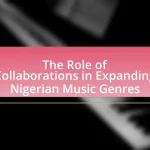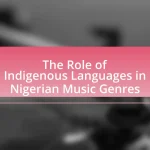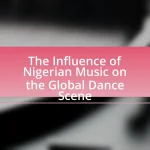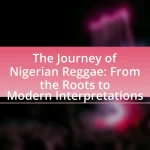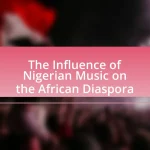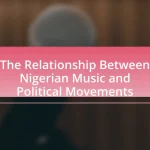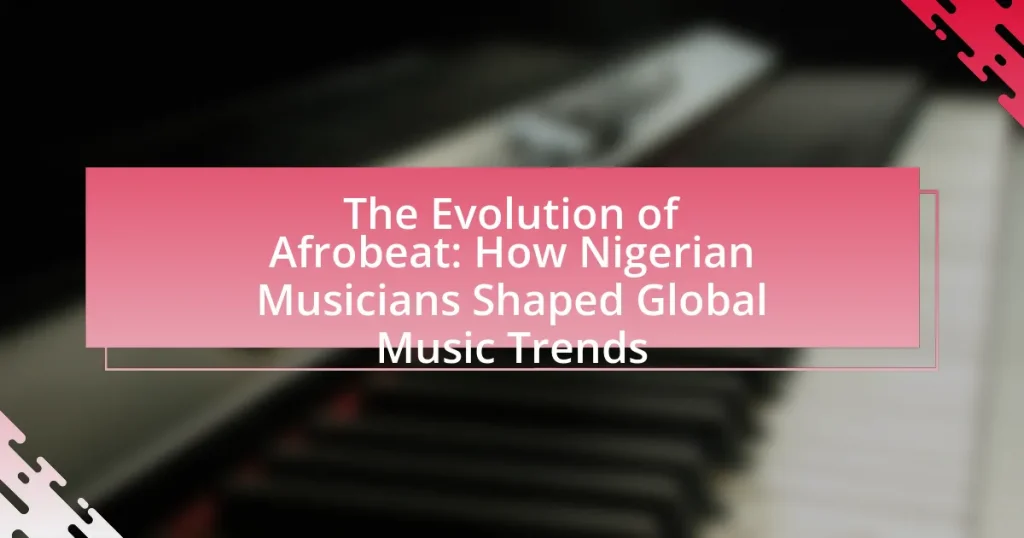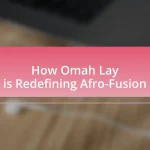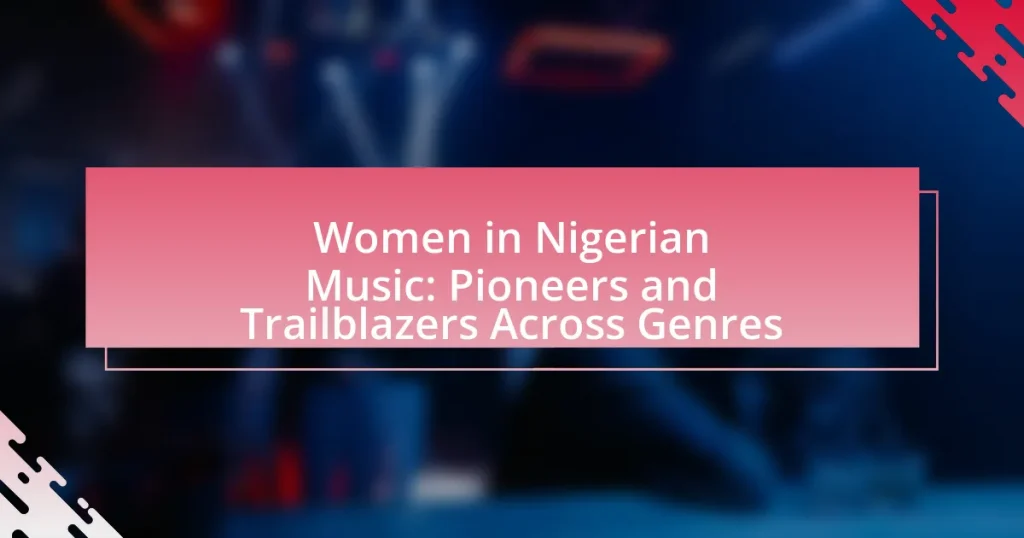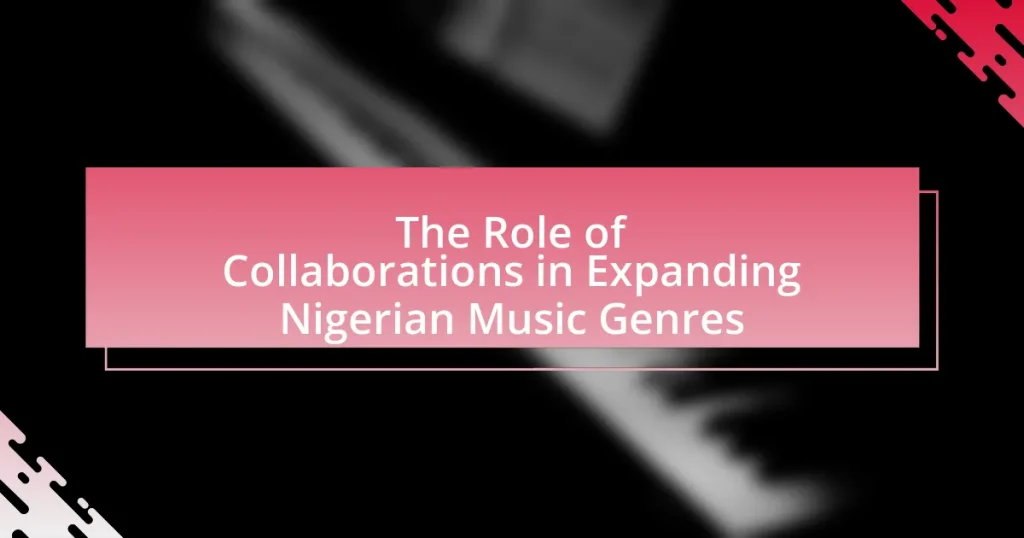Afrobeat is a music genre that originated in Nigeria during the late 1960s and 1970s, characterized by a fusion of traditional African rhythms, jazz, funk, and highlife. Pioneered by Fela Kuti, Afrobeat served as a platform for political expression and social commentary, addressing issues such as corruption and colonialism. The genre has evolved significantly, influencing global music trends and inspiring contemporary artists like Burna Boy and Wizkid, who have further popularized Afrobeat on the international stage. This article explores the historical context of Afrobeat, its defining characteristics, key pioneers, and its impact on global music, as well as the challenges it faces in maintaining authenticity amidst commercialization and globalization.

What is Afrobeat and its Historical Context?
Afrobeat is a music genre that combines traditional African rhythms, jazz, funk, and highlife, primarily developed in Nigeria during the late 1960s and 1970s. The genre was pioneered by Fela Kuti, who used it as a platform for political expression and social commentary, addressing issues such as corruption and colonialism in Nigeria. Afrobeat’s historical context is rooted in the post-colonial era of Nigeria, where musicians sought to create a distinct cultural identity that reflected both African heritage and contemporary influences. The genre gained international recognition, influencing global music trends and inspiring artists across various genres, thereby solidifying its impact on world music.
How did Afrobeat originate in Nigeria?
Afrobeat originated in Nigeria through the fusion of traditional African music, jazz, highlife, and funk, primarily pioneered by musician Fela Kuti in the late 1960s. Kuti’s innovative approach combined complex rhythms, socially conscious lyrics, and a large ensemble of musicians, creating a distinct sound that addressed political issues in Nigeria. The genre gained prominence as Kuti used it as a platform for activism, reflecting the socio-political climate of the time, which included military rule and corruption. This blend of musical styles and cultural commentary established Afrobeat as a significant genre in both Nigerian and global music scenes.
What cultural influences contributed to the birth of Afrobeat?
Afrobeat emerged from a blend of various cultural influences, primarily West African traditional music, jazz, highlife, and funk. Traditional West African music provided rhythmic complexity and call-and-response patterns, while jazz introduced improvisation and instrumental sophistication. Highlife, a genre from Ghana, contributed melodic elements and danceable grooves, and funk added a strong backbeat and electric instrumentation. These influences coalesced in the 1960s and 1970s, particularly through the work of Nigerian musician Fela Kuti, who is credited with popularizing Afrobeat and integrating political themes into the music, further solidifying its cultural significance.
Who were the key pioneers of Afrobeat music?
The key pioneers of Afrobeat music are Fela Kuti, Tony Allen, and Antibalas. Fela Kuti, often referred to as the father of Afrobeat, combined traditional African rhythms with jazz, funk, and highlife, creating a unique sound that emerged in the late 1960s. Tony Allen, as Fela’s drummer, played a crucial role in developing the complex rhythms that define Afrobeat. Antibalas, a contemporary Afrobeat band formed in the late 1990s, helped to revive and popularize the genre globally, drawing inspiration from Kuti’s work and expanding its reach.
What are the defining characteristics of Afrobeat?
Afrobeat is characterized by a fusion of traditional African music, jazz, highlife, and funk, creating a complex rhythmic structure. This genre typically features extended instrumental sections, intricate polyrhythms, and a strong emphasis on groove, often driven by a large ensemble of musicians including brass, percussion, and guitars. Additionally, Afrobeat incorporates socially and politically charged lyrics, reflecting the socio-political landscape of Nigeria, particularly through the works of influential artists like Fela Kuti, who used music as a form of activism. The genre’s signature sound is marked by its use of call-and-response vocals and layered instrumentation, which together create a vibrant and dynamic listening experience.
How does instrumentation shape the sound of Afrobeat?
Instrumentation is fundamental in shaping the sound of Afrobeat by integrating diverse musical elements, primarily through the use of traditional African instruments alongside Western instruments. The genre typically features a prominent rhythm section, including drums, congas, and bass guitar, which create a polyrhythmic foundation essential to its groove. Additionally, brass instruments like trumpets and saxophones add melodic layers and harmonic richness, while electric guitars contribute to the genre’s modern sound.
The fusion of these instruments not only reflects Nigeria’s cultural heritage but also incorporates influences from jazz, funk, and highlife, resulting in a unique sonic identity. For instance, Fela Kuti, a pioneer of Afrobeat, utilized this blend to craft complex arrangements that engage listeners both rhythmically and melodically, demonstrating how instrumentation is pivotal in defining the genre’s character and appeal.
What role do lyrics and themes play in Afrobeat music?
Lyrics and themes in Afrobeat music serve as a powerful medium for social commentary and cultural expression. They often address political issues, social injustices, and personal experiences, reflecting the realities of life in Nigeria and beyond. For instance, Fela Kuti, the pioneer of Afrobeat, used his lyrics to critique government corruption and advocate for human rights, which resonated deeply with audiences and inspired activism. This thematic focus not only enhances the musical experience but also engages listeners in critical conversations about societal challenges, making Afrobeat a significant cultural force.
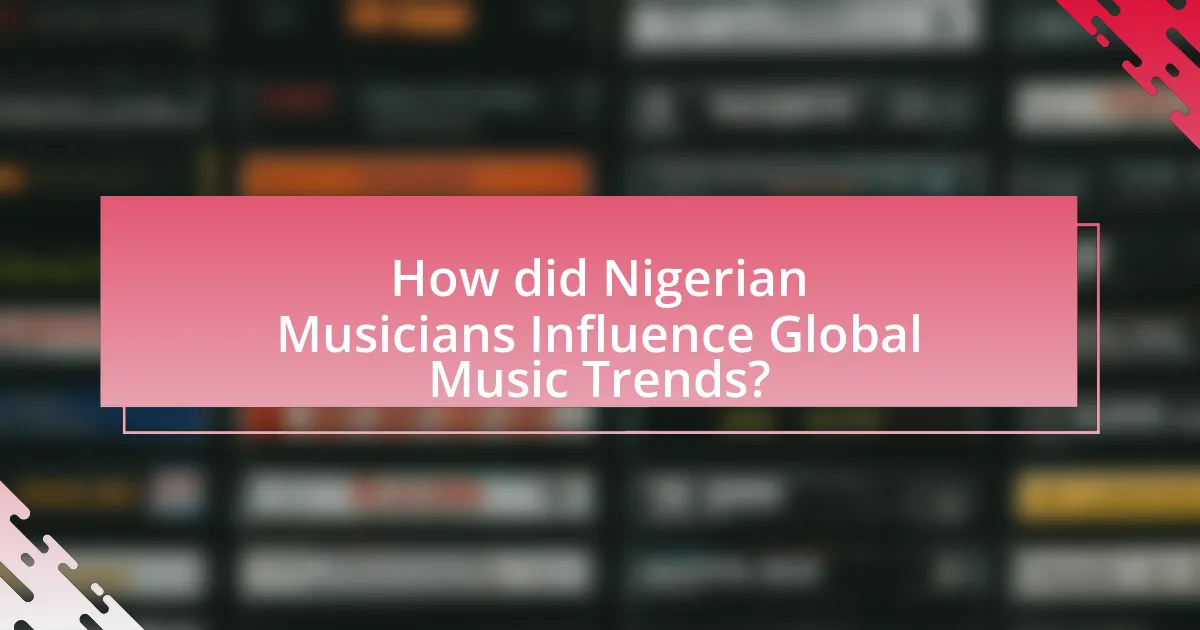
How did Nigerian Musicians Influence Global Music Trends?
Nigerian musicians have significantly influenced global music trends through the popularization of Afrobeat, a genre that blends traditional African rhythms with jazz, funk, and highlife. Artists like Fela Kuti pioneered this genre in the 1960s and 1970s, using music as a form of political expression, which resonated globally and inspired numerous artists across various genres. The rise of contemporary Nigerian artists, such as Burna Boy and Wizkid, has further propelled Afrobeat into mainstream music, with Burna Boy’s album “African Giant” receiving a Grammy nomination and Wizkid’s collaboration with Drake on “One Dance” topping charts worldwide. This cross-cultural exchange has led to a fusion of sounds, with elements of Afrobeat being incorporated into pop, hip-hop, and electronic music, showcasing the genre’s far-reaching impact on global music trends.
What impact did Fela Kuti have on the global perception of Afrobeat?
Fela Kuti significantly elevated the global perception of Afrobeat by introducing its unique blend of traditional African rhythms, jazz, and funk to international audiences. His innovative music and politically charged lyrics resonated with listeners worldwide, particularly during the 1970s and 1980s, when he gained prominence through performances in Europe and the United States. Kuti’s albums, such as “Zombie” and “Expensive Shit,” not only showcased the genre’s complexity but also addressed social and political issues in Nigeria, thereby attracting attention from global music critics and fans. His influence is evident in the way Afrobeat has inspired contemporary artists across various genres, solidifying its place in the global music landscape.
How did Fela Kuti’s activism influence his music and its reception worldwide?
Fela Kuti’s activism significantly influenced his music by embedding political and social commentary into his lyrics, which resonated with audiences worldwide. His songs often addressed issues such as government corruption, human rights abuses, and the struggles of the Nigerian people, making his music a powerful tool for social change. This direct engagement with pressing societal issues not only enhanced the depth of his music but also attracted a global audience that appreciated the fusion of traditional African rhythms with jazz and funk, known as Afrobeat. The reception of his work was further amplified by his live performances, which were characterized by their energetic and provocative nature, drawing attention to his messages and solidifying his status as a cultural icon. Kuti’s ability to challenge authority through his art led to both admiration and controversy, ultimately establishing him as a pivotal figure in the global music landscape.
What collaborations helped spread Afrobeat internationally?
Collaborations with international artists such as Drake, Beyoncé, and Major Lazer significantly helped spread Afrobeat internationally. For instance, Wizkid’s feature on Drake’s “One Dance” in 2016 brought Afrobeat to mainstream audiences, leading to widespread recognition and chart success. Similarly, Burna Boy’s collaboration with Beyoncé on “Ja Ara E” for the “Lion King: The Gift” album in 2019 showcased Afrobeat’s influence in global pop music. Additionally, Major Lazer’s remix of “Soco” by Wizkid further popularized the genre in Western markets. These collaborations not only elevated individual artists but also introduced Afrobeat’s unique sound to a broader audience, solidifying its place in global music trends.
How has Afrobeat evolved in the 21st century?
Afrobeat has evolved significantly in the 21st century, transitioning from its traditional roots into a global phenomenon that incorporates various musical styles and influences. This evolution is marked by the fusion of Afrobeat with genres such as hip-hop, dancehall, and electronic music, leading to a broader appeal and international collaborations. Notable artists like Burna Boy and Wizkid have played pivotal roles in this transformation, achieving global chart success and recognition, exemplified by Burna Boy’s Grammy win in 2020 for his album “Twice as Tall.” The rise of digital platforms has also facilitated the dissemination of Afrobeat, allowing it to reach diverse audiences worldwide, thereby solidifying its status as a major influence in contemporary music.
What new artists are shaping the modern Afrobeat scene?
New artists shaping the modern Afrobeat scene include Tems, Omah Lay, and Ayra Starr. Tems gained international recognition with her collaboration on Wizkid’s “Essence,” which topped charts globally, showcasing her unique sound and vocal prowess. Omah Lay emerged with hits like “Bad Influence,” blending Afrobeat with contemporary R&B, and has been praised for his innovative approach. Ayra Starr, with her debut EP “Ayra Starr,” has quickly become a prominent figure, known for her catchy melodies and relatable lyrics, further expanding the genre’s reach. These artists exemplify the evolution of Afrobeat, contributing fresh perspectives and sounds that resonate with a global audience.
How are contemporary Afrobeat artists blending genres?
Contemporary Afrobeat artists are blending genres by incorporating elements from hip-hop, R&B, jazz, and electronic music into their sound. This fusion creates a diverse musical landscape that appeals to a global audience, as seen in the works of artists like Burna Boy and Wizkid, who seamlessly integrate traditional African rhythms with modern production techniques. For instance, Burna Boy’s album “African Giant” features collaborations with American artists and incorporates reggae and dancehall influences, demonstrating the genre’s adaptability and cross-cultural appeal. This genre-blending not only enhances the richness of Afrobeat but also positions it as a significant player in the global music scene.
What are the Global Implications of Afrobeat’s Evolution?
The global implications of Afrobeat’s evolution include the genre’s influence on international music styles, cultural exchange, and economic opportunities for African artists. Afrobeat has integrated elements from jazz, funk, and traditional African rhythms, leading to a fusion that resonates worldwide, as seen in the works of artists like Burna Boy and Wizkid, who have achieved significant chart success in markets such as the United States and Europe. This genre’s rise has fostered cultural appreciation and collaboration, exemplified by the Grammy Awards recognizing Afrobeat artists, which enhances visibility for African music on a global stage. Additionally, the genre’s popularity has stimulated the African music industry, creating new revenue streams and job opportunities, thereby contributing to economic growth in the region.
How has Afrobeat influenced other music genres globally?
Afrobeat has significantly influenced various global music genres by integrating its complex rhythms, polyrhythmic structures, and rich instrumentation into styles such as hip-hop, electronic dance music, and jazz. Artists like Fela Kuti, the pioneer of Afrobeat, laid the groundwork for this fusion, which has been adopted by contemporary musicians worldwide. For instance, the incorporation of Afrobeat elements can be seen in the works of artists like Beyoncé and Drake, who have blended these sounds into their music, thereby expanding the genre’s reach. Additionally, the rise of Afrobeats, a genre derived from Afrobeat, has further popularized its influence, with tracks like “Essence” by Wizkid achieving global chart success and showcasing Afrobeat’s rhythmic appeal to a broader audience.
What elements of Afrobeat can be found in popular music today?
Afrobeat elements found in popular music today include polyrhythmic percussion, extended instrumental sections, and socially conscious lyrics. These characteristics have influenced genres such as hip-hop, R&B, and electronic music, with artists like Beyoncé and Drake incorporating Afrobeat rhythms and styles into their tracks. The global rise of Afrobeat has been evidenced by the success of artists like Burna Boy and Wizkid, who blend traditional Afrobeat with contemporary sounds, further solidifying its impact on modern music.
How do international artists incorporate Afrobeat into their work?
International artists incorporate Afrobeat into their work by blending its rhythmic patterns, instrumentation, and cultural themes with various genres such as hip-hop, pop, and electronic music. For instance, artists like Drake and Beyoncé have featured Afrobeat rhythms and collaborations with Nigerian musicians, enhancing their global appeal and showcasing the genre’s influence. The incorporation of Afrobeat elements often includes the use of traditional instruments like the talking drum and the incorporation of call-and-response vocal techniques, which are hallmarks of the genre. This fusion not only broadens the audience for Afrobeat but also highlights its significance in contemporary music, as evidenced by the rise of Afrobeat-influenced tracks on international music charts.
What challenges does Afrobeat face in maintaining its authenticity?
Afrobeat faces significant challenges in maintaining its authenticity primarily due to commercialization and globalization. As the genre gains international popularity, mainstream music influences often dilute its traditional elements, leading to a blend that may stray from its roots. For instance, artists may prioritize commercial success over cultural representation, resulting in music that caters to global markets rather than preserving the original Afrobeat sound pioneered by Fela Kuti. Additionally, the rise of digital platforms facilitates the rapid spread of diverse musical styles, which can overshadow authentic Afrobeat, making it difficult for artists to stay true to their cultural heritage while appealing to a broader audience.
How do commercialization and globalization affect Afrobeat’s identity?
Commercialization and globalization significantly alter Afrobeat’s identity by introducing mainstream appeal and cross-cultural influences. As Afrobeat gains international recognition, it often adapts to fit global music trends, which can dilute its traditional elements. For instance, artists like Burna Boy and Wizkid incorporate various genres such as hip-hop and pop, reflecting a blend of local and global sounds. This fusion can lead to a shift in the genre’s original socio-political messages, as commercial success often prioritizes marketability over cultural authenticity. The rise of platforms like Spotify and Apple Music further accelerates this transformation, allowing Afrobeat to reach wider audiences but also pressuring artists to conform to global music standards.
What can aspiring musicians learn from the evolution of Afrobeat?
Aspiring musicians can learn the importance of blending diverse musical influences from the evolution of Afrobeat. Afrobeat, pioneered by Fela Kuti in the 1960s, combines traditional African rhythms with jazz, funk, and highlife, demonstrating how cross-genre experimentation can create a unique sound that resonates globally. This genre’s success illustrates that innovation often arises from cultural fusion, encouraging musicians to explore and integrate various styles and traditions in their own work. The global impact of Afrobeat, evidenced by its influence on artists worldwide and its incorporation into mainstream music, underscores the value of originality and cultural representation in achieving broader appeal.
What best practices can be adopted from Afrobeat’s success story?
Afrobeat’s success story demonstrates several best practices that can be adopted, including the fusion of diverse musical styles, strong cultural identity, and strategic global collaborations. The genre effectively blends traditional African rhythms with jazz, funk, and highlife, creating a unique sound that appeals to a broad audience. This fusion has been pivotal in attracting international listeners and artists, as seen with the global popularity of artists like Burna Boy and Wizkid.
Additionally, Afrobeat emphasizes a strong cultural narrative, often addressing social and political issues, which resonates deeply with audiences and fosters a loyal fan base. The genre’s artists leverage social media and digital platforms for promotion, allowing them to reach global audiences efficiently. For instance, Burna Boy’s Grammy win in 2020 highlighted the potential for African artists to gain recognition on international stages, showcasing the effectiveness of strategic collaborations with global music icons.
These practices underscore the importance of innovation, cultural authenticity, and leveraging technology in achieving global success in the music industry.
How can musicians balance cultural authenticity with global appeal?
Musicians can balance cultural authenticity with global appeal by integrating traditional elements of their music with contemporary styles that resonate with a wider audience. For instance, Nigerian musicians often incorporate indigenous rhythms, instruments, and languages into their work while blending genres like hip-hop, pop, and electronic music, which enhances their global reach. This approach is exemplified by artists such as Burna Boy and Wizkid, who have successfully fused Afrobeat with global music trends, leading to international collaborations and chart success. The global popularity of Afrobeat, evidenced by its presence on platforms like Spotify and its influence on artists worldwide, demonstrates that maintaining cultural roots while embracing modern influences can create a compelling and relatable sound.

